The unbearable lightness of being Justin Trudeau .. just what Canada after Stephen Harper wants?
Sep 28th, 2012 | By Counterweights Editors | Category: In Brief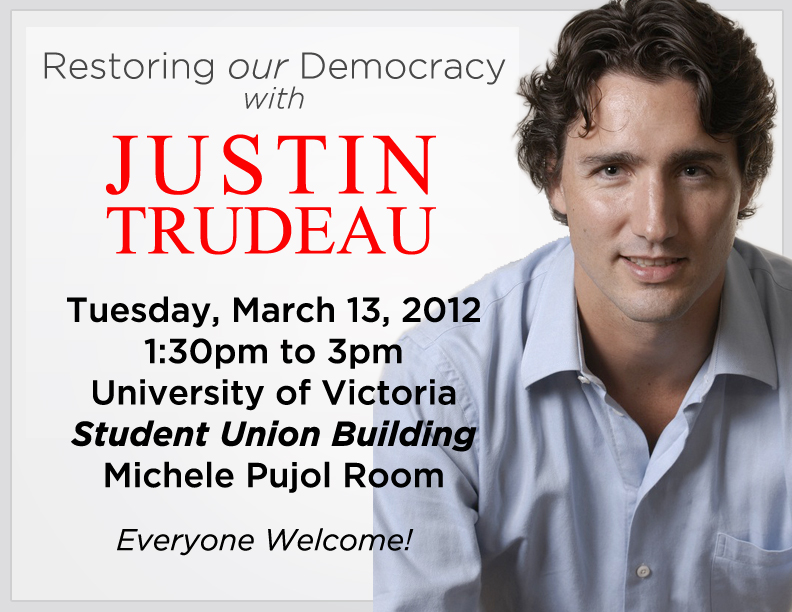 We still don’t know for dead certain that Justin Pierre James Trudeau will be throwing his hair into the ring. But eminent Ottawa journalists have reported “Mr. Trudeau is expected to announce next week [Tuesday, some especially bold scribes are saying] that he is a candidate for leader of the Liberal Party of Canada.”
We still don’t know for dead certain that Justin Pierre James Trudeau will be throwing his hair into the ring. But eminent Ottawa journalists have reported “Mr. Trudeau is expected to announce next week [Tuesday, some especially bold scribes are saying] that he is a candidate for leader of the Liberal Party of Canada.”
And, in one respect or another : “He brings more than a famous name and gorgeous hair to the contest” [John Ibbitson in the alleged national newspaper known as the Globe and Mail].
We also don’t know for certain that, even if he does become a candidate, the eldest son of the man whom 36% of Canadians today regard as the “best” prime minister since 1968 will win the federal Liberal leadership race. (Which will finally end in Ottawa on April 14, 2013.)
Yet as Michael Den Tandt has explained in the Vancouver Sun: “Failing an eleventh-hour entry into the Liberal leadership race by some unlikely giant-killer – say, Bank of Canada governor Mark Carney, or Clark Kent –Â Justin Trudeau is the guy. He will win the leadership handily and seek to follow in his father’s footsteps.” (And note here as well, this just in: “Bank of Canada: Mark Carney is not running for Liberal leader, so stop asking.”)
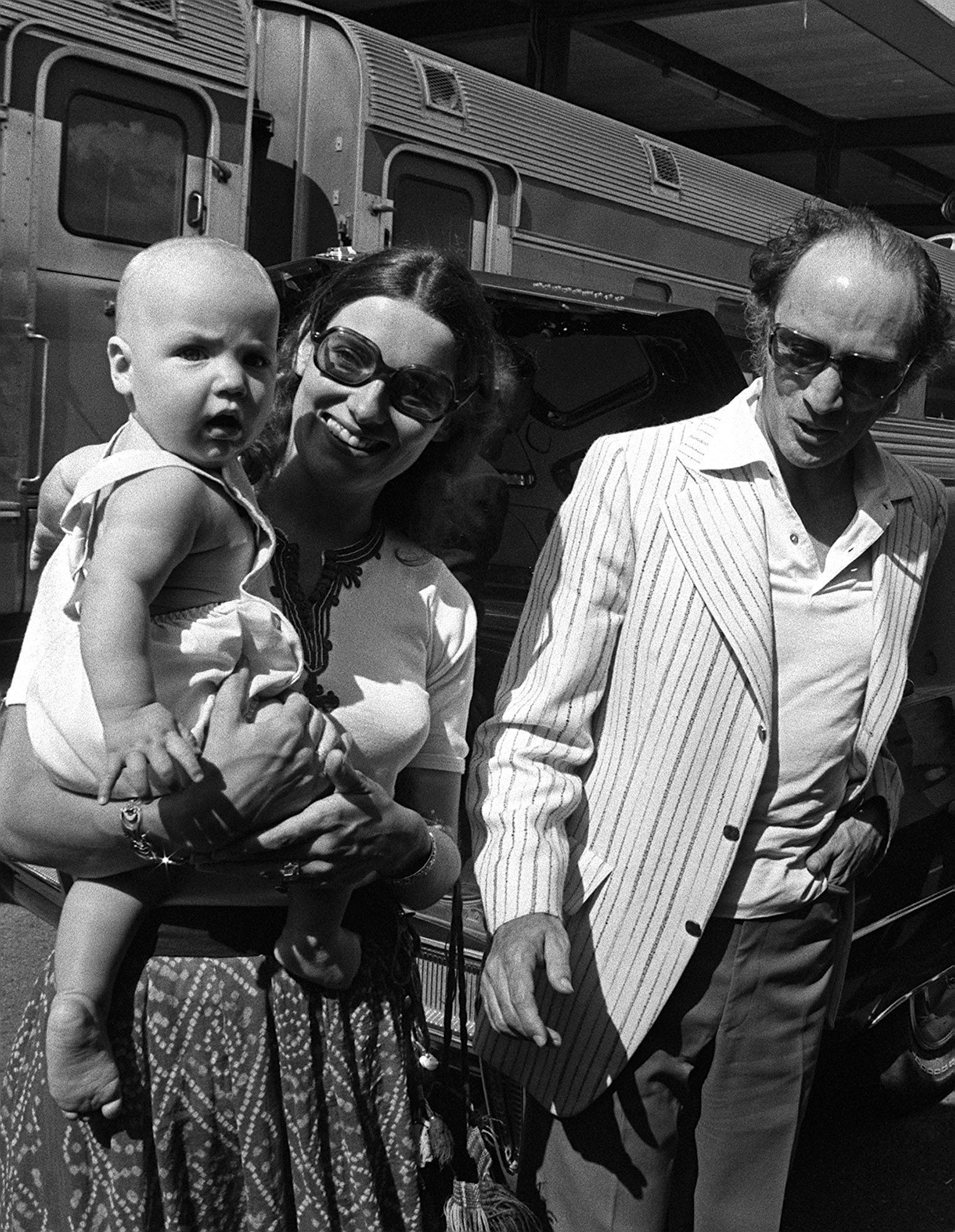 And then, supposing Justin Trudeau does enter the race, and then wins in the middle of April (still more than six long months away), what next? You might think, as we still do, that the always interesting Chantal Hébert was onto something in yesterday’s Toronto Star : “As things stand, the odds that the victor of next April’s leadership vote will one day serve in the cabinet of an NDP-led coalition government are higher than those of a swift Liberal return to power.”
And then, supposing Justin Trudeau does enter the race, and then wins in the middle of April (still more than six long months away), what next? You might think, as we still do, that the always interesting Chantal Hébert was onto something in yesterday’s Toronto Star : “As things stand, the odds that the victor of next April’s leadership vote will one day serve in the cabinet of an NDP-led coalition government are higher than those of a swift Liberal return to power.”
But then again there was also yesterday’s “exclusive poll conducted for the National Post” by Forum Research. This found that “if Mr. Trudeau were leader of the Liberal Party and an election were held today, the Grits would win, handily, with 39% of the popular vote … Prime Minister Stephen Harper’s Conservatives would come in second, with 32% of the vote, and the NDP – today the Official Opposition and led by Thomas Mulcair – would return to third-party status, with just 20% of the vote.”
* * * *
This is, of course, getting way too far ahead of the curve. For the time being, we would just offer several further thoughts/observations/etc/etc, that may or may not prove helpful:
The unbearable lightness of the dilettante lightweight being … (or does it actually need to be dispelled)?
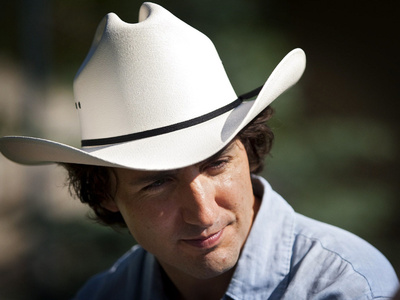 Opinion polls notwithstanding, via various on-the-street grapevines we continue to hear a lot of scepticism about Justin Trudeau from people outside Quebec, who have almost certainly voted Liberal at some point in the past.
Opinion polls notwithstanding, via various on-the-street grapevines we continue to hear a lot of scepticism about Justin Trudeau from people outside Quebec, who have almost certainly voted Liberal at some point in the past.
He at least ought to do something over the next six months to change the minds of those in his own party who see him as some kind of dilettante lightweight, who is ultimately just not up to the job of something as serious as Leader of the Liberal Party of Canada.
It may even be that his prospects of finally winning the contest that will end in the middle of April 2013 are not quite as vast as the calculations of the current media frenzy suggest?
(On the other hand, there do seem to be those who urge, rightly or wrongly, that Justin Trudeau’s image as a dilettante lightweight – and “not the political thinker that his father used to be” – is ultimately part of his current popular appeal?)
Can he really eat the NDP’s new lunch in Quebec?
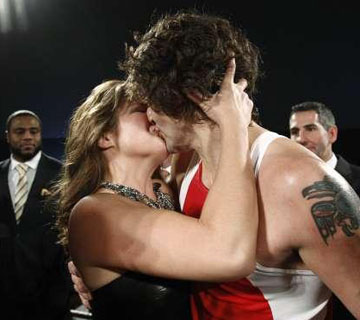 The calculations of Micheal Den Tandt and others that “Trudeau’s perfect fluency in French, his flair for the dramatic and the boxing match [ie his surprise win this past March 31, in a charity fight with Conservative Senator Patrick Brazeau] all make him a force to be reckoned with” inside Quebec may not altogether add up either.
The calculations of Micheal Den Tandt and others that “Trudeau’s perfect fluency in French, his flair for the dramatic and the boxing match [ie his surprise win this past March 31, in a charity fight with Conservative Senator Patrick Brazeau] all make him a force to be reckoned with” inside Quebec may not altogether add up either.
We pondered some aspects of this issue in our own report of this past March 5, 2012Â – “The quiet evolution of ‘La femme de Justin Trudeau’ carries on .. almost as if it knows what it’s doing?” (And over the past few days this piece has seen a fresh burst of interest in the counterweights internal visit statistics.)
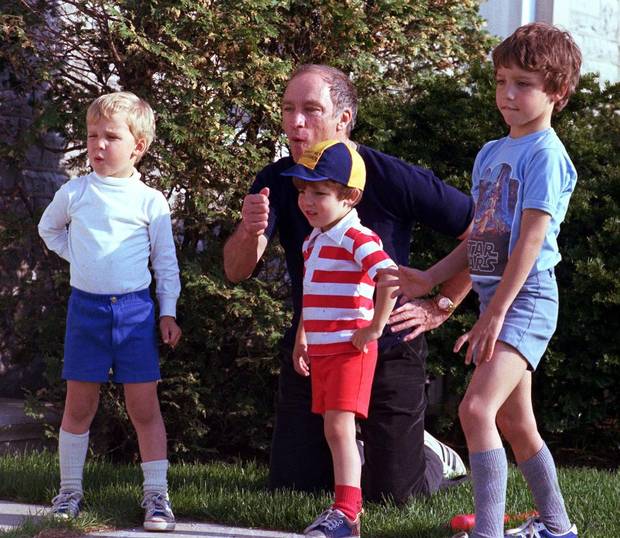 Cf, eg, Lysiane Gagnon on how “the infatuation of so many anglophone Liberals with Justin Trudeau has always been incomprehensible on this side of the Ottawa River … as if, in a weird nostalgia for monarchy, the Liberals longed for a Trudeau dynasty.”
Cf, eg, Lysiane Gagnon on how “the infatuation of so many anglophone Liberals with Justin Trudeau has always been incomprehensible on this side of the Ottawa River … as if, in a weird nostalgia for monarchy, the Liberals longed for a Trudeau dynasty.”
We did speculate ourselves last March 5 that the “appearance of Justin and Sophie on [the Radio-Canada hit TV show] ‘Tout le monde en parle’ last night may have finally begun to change all this” negative feeling about Justin Trudeau in Quebec. But for the time being at any rate, it may be rash to jump to too many conclusions about the ability of a federal Liberal party led by the young Mr. Trudeau to “eat the NDP’s lunch” east of the Ottawa River.
Should his policy on Federalism and the French Canadians be exactly the same as his father’s?
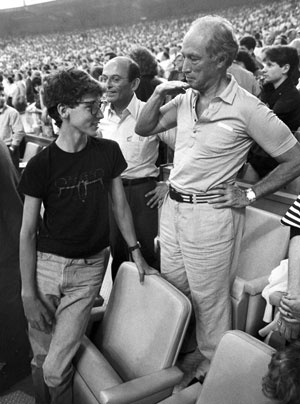 Yesterday in the Globe and Mail Zach Paikin, a candidate for National Policy Chair of the Liberal Party of Canada at the party’s 2012 biennial convention, wrote about how, a while back now, the “Papineau MP [ie Justin Trudeau] explicitly established the fact that there are certain conditions that, if fulfilled, could cause him to support Quebec separatism.”
Yesterday in the Globe and Mail Zach Paikin, a candidate for National Policy Chair of the Liberal Party of Canada at the party’s 2012 biennial convention, wrote about how, a while back now, the “Papineau MP [ie Justin Trudeau] explicitly established the fact that there are certain conditions that, if fulfilled, could cause him to support Quebec separatism.”
Mr. Paikin went on: “Now that Mr. Trudeau is set to launch a leadership bid – and by consequence a run for prime minister of Canada – now would be a particularly opportune time to bring these comments back into the fore … Mr. Trudeau has attempted … to elucidate his original comments on Quebec separatism. But he has yet to withdraw them.”
To us this implies that the young Mr. Trudeau pretty much ought to share his father’s position on French Canadians, Quebec, and “national unity.” Yet as our colleague Randall White argued in a September 28, 2010 counterweights contribution (“Whether you loved or loathed him, no one is as big as Pierre Trudeau in Canadian politics today”), Trudeau the Elder’s national unity vision needs some updating in the Canada of the 21st century.
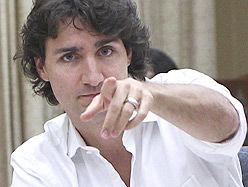 We’d hope ourselves that a Liberal Party of Canada led by Justin Trudeau would embark on just this kind of needed updating. And as we noted ourselves in our own related counterweights posting this past March 5: “It seems to us that Chantal Hébert catches the underlying motivation of ‘Trudeau fils’ – and the regional/national strategy that saw another element moving into place on Radio-Canada TV last night.”
We’d hope ourselves that a Liberal Party of Canada led by Justin Trudeau would embark on just this kind of needed updating. And as we noted ourselves in our own related counterweights posting this past March 5: “It seems to us that Chantal Hébert catches the underlying motivation of ‘Trudeau fils’ – and the regional/national strategy that saw another element moving into place on Radio-Canada TV last night.”
We went on to quote from a February 15, 2012 Toronto Star article by Ms Hébert: “In Quebec federalist quarters, including the provincial government, the Conservative monarchist rebranding of the country is seen as an ill-advised return to Canada’s colonial past … Liberal MP Justin Trudeau’s statement that he would support an independent Quebec rather than live in a Canada where equality rights no longer had their place was only the latest manifestation of that malaise.”
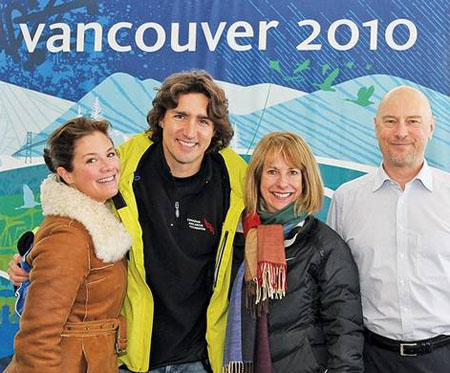 And Ms Hebert continued: “(As an aside: Those who presume that his father Pierre Trudeau would have disagreed have forgotten that he devoted his career to turning Canada into a Charter society.) … In a subsequent interview, an unrepentant Trudeau went a step further. ‘The separatist option is not the bogeyman it used to be. You ask me what the bogeyman is? It’s the one sitting in our prime minister’s chair right now,’ Trudeau told the CBC.”
And Ms Hebert continued: “(As an aside: Those who presume that his father Pierre Trudeau would have disagreed have forgotten that he devoted his career to turning Canada into a Charter society.) … In a subsequent interview, an unrepentant Trudeau went a step further. ‘The separatist option is not the bogeyman it used to be. You ask me what the bogeyman is? It’s the one sitting in our prime minister’s chair right now,’ Trudeau told the CBC.”
Three final brief notes … on Sophie Gregoire Trudeau, a Canadian progressive coalition, and the ancient British empire case of the Elder and Younger William Pitt
(1) Drawing attention to our own report of this past March 5, 2012 – “The quiet evolution of ‘La femme de Justin Trudeau’ carries on .. almost as if it knows what it’s doing?” – also spotlights the Younger Trudeau’s possibly quite important (and as yet not all that often noticed?) wife, Sophie Gregoire.
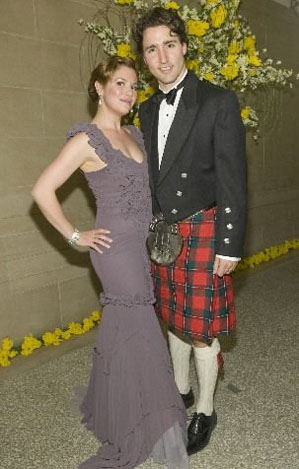 Michael Den Tandt shrewdly enough notes that “Harper’s team has reason to fear Trudeau’s charm, his particular appeal in Quebec, Ontario and BC [the three largest Canadian provinces, btw], and the Liberal Party’s timetested ability to morph into whatever policy shape best suits its needs at any given time.” Mrs. Justin Trudeau is certainly part of Justin Trudeau’s charm. It was no accident that they appeared together on Radio-Canada’s ‘Tout le monde en parle’ this past March. And, assuming the inside dope about Sophie and Justin’s current plans is correct, it will be interesting to see what role she plays in his Liberal leadership campaign.
Michael Den Tandt shrewdly enough notes that “Harper’s team has reason to fear Trudeau’s charm, his particular appeal in Quebec, Ontario and BC [the three largest Canadian provinces, btw], and the Liberal Party’s timetested ability to morph into whatever policy shape best suits its needs at any given time.” Mrs. Justin Trudeau is certainly part of Justin Trudeau’s charm. It was no accident that they appeared together on Radio-Canada’s ‘Tout le monde en parle’ this past March. And, assuming the inside dope about Sophie and Justin’s current plans is correct, it will be interesting to see what role she plays in his Liberal leadership campaign.
(2) Drawing attention to Chantal Hébert’s observation that as “things stand, the odds that the victor of next April’s leadership vote will one day serve in the cabinet of an NDP-led coalition government are higher than those of a swift Liberal return to power” also reminds us that we have long believed (and continue to do so) in some form of New Democrat-Liberal or Liberal-New Democrat coalition or co-operation, as the best hope for progressive, forward-looking, and economically dynamic federal government in Ottawa.
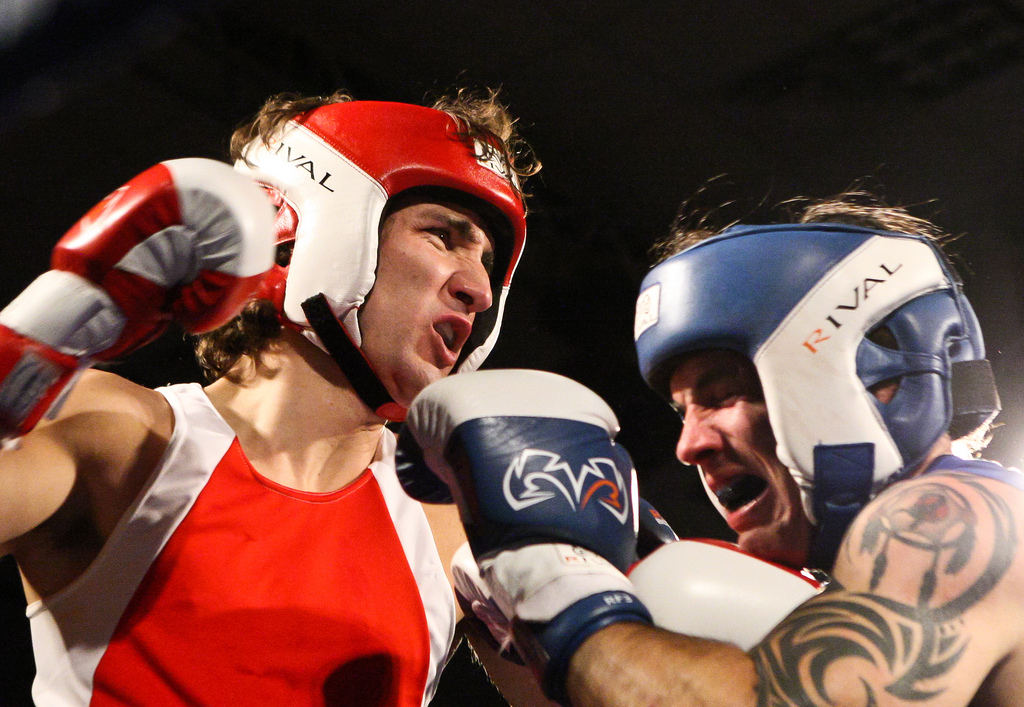 The latest Forum Research poll notwithstanding (again), Justin Trudeau as a leading figure in some such co-operative progressive enterprise may actually be a more attractive proposition than Justin Trudeau as the leader of a Liberal Party that suddenly (and once again, some might say) flukes into sole control of the levers of power on the banks of the Ottawa River, with a mere 39% of the Canada-wide popular vote. Many federal Liberals today may look askance at all this, but it could still be the future in spite of both them and their counterparts in the new NDP/NPD?
The latest Forum Research poll notwithstanding (again), Justin Trudeau as a leading figure in some such co-operative progressive enterprise may actually be a more attractive proposition than Justin Trudeau as the leader of a Liberal Party that suddenly (and once again, some might say) flukes into sole control of the levers of power on the banks of the Ottawa River, with a mere 39% of the Canada-wide popular vote. Many federal Liberals today may look askance at all this, but it could still be the future in spite of both them and their counterparts in the new NDP/NPD?
(3) There has been much talk about democratic family dynasty precedents for the case of Pierre and Justin Trudeau in Canadian politics (and notwithstanding the sharp remarks of Lysiane Gagnon on this subject, and those who share her views).
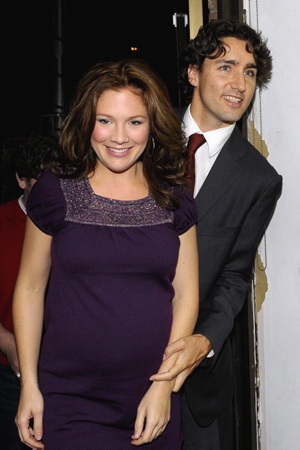 A recent CBC News report alludes to “Kennedy or Romney south of the border … the likes of Bushes or even the Clintons … Former Prime Minister Paul Martin’s father, Paul Martin Sr … Preston Manning, the former opposition leader and the founder of the Reform Party” whose “father, Ernest Manning, was the Social Credit Party premier of Alberta from 1943 to 1968.”
A recent CBC News report alludes to “Kennedy or Romney south of the border … the likes of Bushes or even the Clintons … Former Prime Minister Paul Martin’s father, Paul Martin Sr … Preston Manning, the former opposition leader and the founder of the Reform Party” whose “father, Ernest Manning, was the Social Credit Party premier of Alberta from 1943 to 1968.”
With a bow to Stephen Harper’s special fondness for the legacies of the British empire in Canada, we’d end all our speculations here with a quick allusion to two prime ministers of the United Kingdom, in the later 18th and early 19th centuries. As father and son they shared both the same first and last names – William Pitt the Elder (1708—1778, PM 1766—1768), and William Pitt the Younger (1759—1806, PM 1783—1801, 1804—1806).
We’ve run out of time and space in this already far too long collection of anecdotes. So those who are really interested in the Trudeaus and the Pitts will have to pursue the Pitt links for themselves. See Wikipedia’s “List of Prime Ministers of the United Kingdom” and, to get the ball rolling, “William Pitt the Elder and William Pitt the Younger” from answers.com.
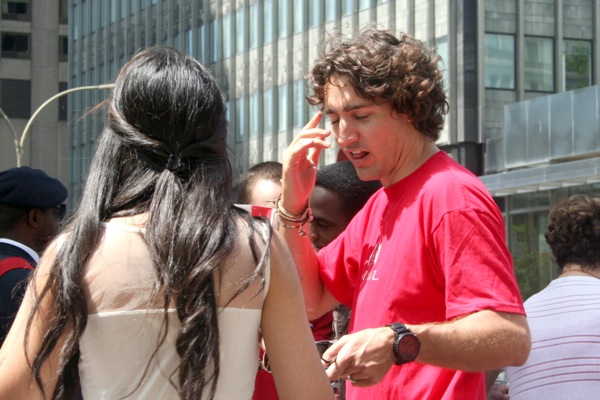 Just two very quick final notes: Pitt the Elder was the “first real Imperialist; credited with the birth of the British Empire; defeated France in Canada, thereby indirectly precipitating the French Revolution.” His memory survives in what is still known as Pittsburgh, Pennsylvania.
Just two very quick final notes: Pitt the Elder was the “first real Imperialist; credited with the birth of the British Empire; defeated France in Canada, thereby indirectly precipitating the French Revolution.” His memory survives in what is still known as Pittsburgh, Pennsylvania.
Pitt the Younger was “Youngest Prime Minister [at 24!]. India Act 1784 …… reduced the national debt … Constitutional Act of 1791 (another Canadian connection); the Macartney Embassy (1792—1794), first of its kind to China; war with France starting in 1793; Cape Colony (South Africa) taken 1795; introduced the first income tax; Act of Union 1800 … Alliance with Russia, Austria and Sweden against France … Battle of Trafalgar … Died in office.”
